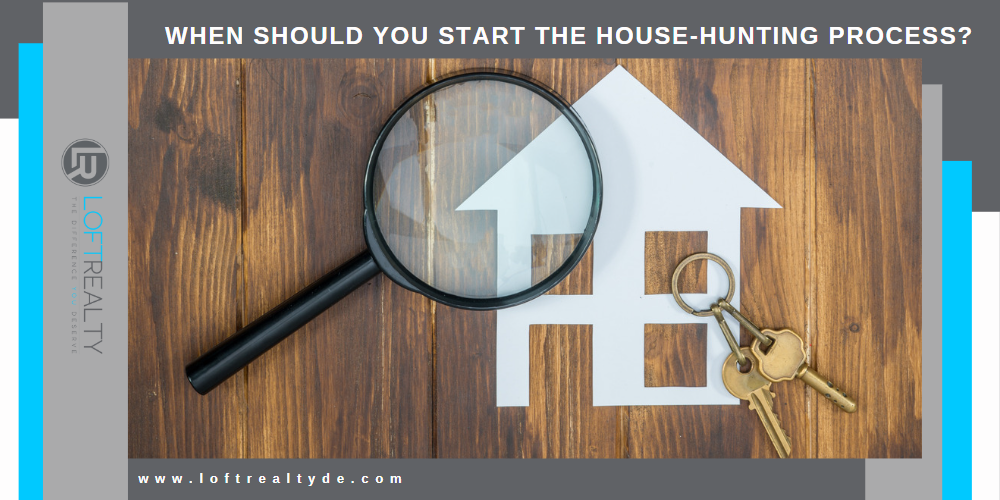When Should You Start The House-Hunting Process?

You've decided to buy your first house. It's thrilling, but it's a little scary! How do you start looking for a place to live? When do you plan to begin?
You can start right away by being honest about your finances, working to improve your credit score, and saving for a down payment. All of these are good ways to get ready. But when is the right time to dig in and get serious?
Life is nothing like a reality TV show. You can't just look at a house, fall in love with it, and move in the next day. It is a process that can sometimes take a long time.
So, let us give you a rundown of the timeline for when you should start preparing for the house-hunting process. Let’s jump right in.
The Best Practice on When To Start Looking For A House
A good rule of thumb is to start looking for a home five to six months before you want to move in. It might seem like a long time, but there's much to do now.
Remember that the process could take longer depending on several things, such as how the market is doing. For example, more people wanted to buy at the end of 2020 and the beginning of 2021, but there were few new listings. At this time, it might take a lot of work to find a place you want to live and outbid other buyers who are very motivated.
We'll use the usual rule of thumb of five months, but remember that you may need to adjust your expectations.
Now that that's out of the way, let's talk about what matters: your lease. You want to avoid having to renew a one-year lease so that you can move into a house. Also, you don't want to be homeless if you don't renew your lease but aren't ready to roll. Finding the right balance might take time and effort.
Start looking for a new place to live about five or six months before the end of your lease. It will allow you to get pre-approved for a mortgage and begin looking at homes.
Typical Timeline Before Moving In
5-6 Months before moving in:
At this point, make sure your search criteria are clear. Think about what you must have, what you'd like to have, and what you don't care about.
Start looking for a quiet place to live. Look for "For Sale" signs online or as you drive around the area. See what you can get and how much it costs.
Continue to save for your down payment, closing costs, and other things you'll need when you move into your new house.
4 Months before moving in:
Things start to pick up speed about four months before you plan to move in. Continue to look for suitable properties.
Get a mortgage pre-approval. Pre-qualification is a way to determine how much you can spend on a house. Pre-approval, on the other hand, means that the lender has looked at your credit, income, and other things and permitted you to borrow a certain amount. A pre-approval letter shows you have the money to take care of your financial obligations.
Talk to a real estate agent with a lot of experience. Some people are waiting, but we don't see why we should. A real estate agent could be a big help, so the sooner you choose one, the better.
3 Months before moving in:
At this time, make sure you have a real estate agent picked out. If you've been putting it off or thinking about a few different options, make a decision. Your real estate agent will use the MLS system and their network to look for homes that meet your needs.
Keep looking at homes! Your search will now be much more specific and valuable. Again, help is available to you, so use it.
2 Months before moving in:
More searches lead to more views. Most people look at about eight different homes before making an offer. Keep going, but keep your expectations in check.
If you have yet to find a home, you should change your search criteria before you look for a home again. If you find a home you'd like to buy, talk to your real estate agent about making an offer.
Keep putting money aside for closing costs and other costs. Most of the time, you can move in within four to six weeks after an offer is accepted.
1 Month before moving in:
Things are getting more exciting! What's next after the offer is accepted and a date for possession is set?
Provide all relevant papers to your mortgage lender. Didn't they already do this when they gave you the green light? Yes, but now they have to go further and find proof (pay stubs, tax returns, etc.). You will also agree to the terms and conditions of your mortgage and figure out how much you'll have to pay each month.
Set up a time to look at the house. Offers should depend on what the inspection finds, and make sure your closing agreement makes this clear. In other words, you can take back your request if dangerous mold is found.
Call your insurance company to get a policy for your home. It could also be a case of closure.
Pack! Get some boxes and packing tape, and get to work. If you need help moving, you can hire movers or find friends and family who will help with pizza.
After finalizing the closing deal, you will finally get the keys. Well done on moving into your new home!
Final Thoughts
Now that you’ve had five to six months to think about it, you can start looking for a house as early as now. If you rush these things, you will feel more worried and stressed. Time allows you to find what you want and avoid settling down in a place that isn't right for you.
If you need a helping hand from an expert team of real estate agents, we at Loft Realty are here to help. Feel free to reach out to us today so we can help you prepare for the next five to six months in your house-hunting process.
Categories
Recent Posts

Top-Rated Hospitals in Delaware

Exciting Events to Heat Up Your Winter in Delaware!

Smarter Home-Buying Decisions

Why Retirees Are Falling in Love with Delaware: Neighborhoods, Communities, and Everything in Between

Best Places to Go Sledding in Delaware

Delaware’s Secret: Reasons Why It’s Not Expensive to Live Here!

5 Best Spots for Last-Minute Holiday Shopping

8 Best Places to Eat at the Rehoboth Beach Boardwalk

The 8 Biggest Mistakes People Make When Moving to Delaware—Here's What You Need to Know

Is Wilmington, Delaware Safe? A Look at Recent Changes in Crime Rates and Community Efforts
GET MORE INFORMATION

